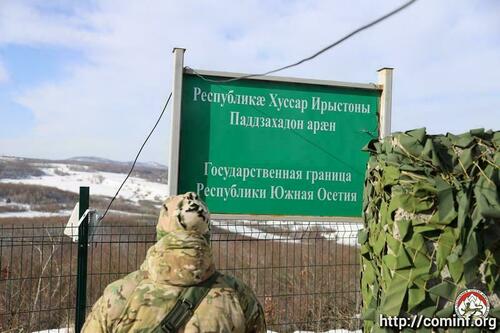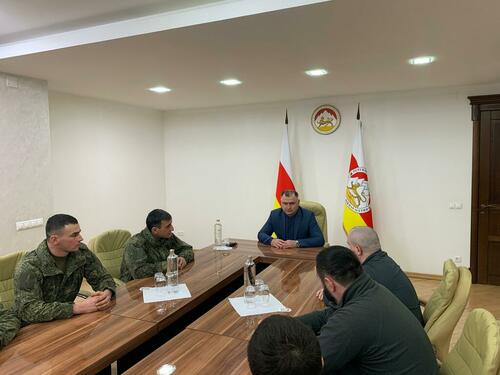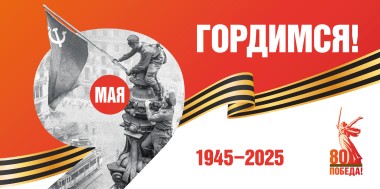The report of the South Ossetia delegation on the results of the 31st round of international discussions on security and stability in Transcaucasia
March 17-18, 2015 in Geneva was held the 31st round of international discussions on security and stability in Transcaucasia. It was attended by the delegation of the Republic of South Ossetia, the Republic of Abkhazia, Georgia, the Russian Federation, the United States, as well as the EU, UN and OSCE representatives. South Ossetian delegation was headed by Presidential Envoy for post-conflict settlement Murat Dzhioev.
The participants of the discussions that take place in accordance with the August 12 and September 8, 2008 Medvedev-Sarkozy agreements, focused on discussing the ways to ensure the non-use of force by Georgia against South Ossetia and Abkhazia , as well as to strengthen security and stability in the region. The South Ossetian delegation called for intensification of the work on bilateral agreements on non-use of force, which would be legally binding, with solid international guarantees, stressing that the drafting of documents on the non-use of force by Georgia against South Ossetia and Abkhazia and security issues is the main task and purpose of the Geneva discussions.
South Ossetian participants rejected the attempts of the Georgian delegation to discuss issues outside the agreed agenda of the Geneva discussions.
The South Ossetian delegation once again appealed to the participants to adopt the joint statement of the commitment to the principle of non-use of force. Earlier the draft statement was submitted by the Russian delegation. Over its approval was carried out expert work, but due to the unconstructive position of the Georgian delegation, the text of the statement has not been coordinated. At the current ro
und the experts will continue the work on the text.
During the discussion of security issues it was noted stability throughout the state border between the Republic of South Ossetia and Georgia, the lack of serious incidents and the reduced number of border violations. At the same time it was considered the destabilizing course of actions of the Georgian side to damage the South Ossetian border signs and buildup of informational tensions the problem of boundaries, points of intersection. South Ossetian representatives reiterated the proposal of the authorities of the Republic of South Ossetia to start working together on the delimitation of the state border between South Ossetia and Georgia.
The panelists noted the effectiveness of the joint mechanisms to prevent and respond to incidents (MPRI), conducting regular meetings in the area of South Ossetian-Georgian border, as well as the "hot line" operating under the MPRI.
South Ossetian and Abkhaz participants expressed concern about the new steps for rapprochement between Georgia and NATO military bloc, the creation on the territory of Georgia NATO infrastructure and continuing aggressive rhetoric of the Georgian authorities against South Ossetia and Abkhazia.
At the insistence of the South Ossetian representatives was continued discussion of issues related to the search for the missing persons and mutual release of prisoners. The South Ossetian delegation briefed the participants of the meeting with a letter of the President of the Republic of South Ossetia Leonid Tibilov to the EU, the UN and the OSCE co-chairs of the Geneva discussions to promote mutual release of citizens of the Republic of South Ossetia and Georgia, imprisoned in South Ossetia and Georgia, respectively, and intensify the search for the missing persons. South Ossetian representatives also proposed to invite former members of the Geneva discussions and the Council of Europe experts, engaged in the study of the issue of the missing citizens of South Ossetia. It was also discussed a number of other humanitarian issues.
Due to the fact that Georgia continues to drag its draft resolution on refugees at the General Assembly of the United Nations, taking advantage of the absence of representation in the United Nations of South Ossetia and Abkhazia, South Ossetia and Abkhazia participants considered it inappropriate to discuss this issue. Resumption of debates on refugees will be possible if Georgia rejects artificial politicization of the problem.
South Ossetian participants raised the issue of historical territories of the East Ossetia, which is now under the control of Georgia. It has been noted that the Georgian authorities are pursuing a policy aimed at ousting the Ossetian population, barring Ossetians to visit the homes of their ancestors, cult objects, appropriation of the property of the Ossetian population and acts of vandalism against the historical and cultural heritage.
In the context of discussing the historical and cultural heritage Ossetian representatives have
reiterated that Georgia continues to ignore the problem of returning historical values, including the unique Tskhinval triptych and antiquities from archaeological excavations.
At the end of the round was supposed to hold a joint meeting of the two working groups to summarize, but the Georgian delegation ignored it.
As part of the 31st round of the Geneva discussions was held an information session dedicated to the problems of threat perception in the context of inter-state relations.
The next meeting in Geneva is scheduled for June 2015.






